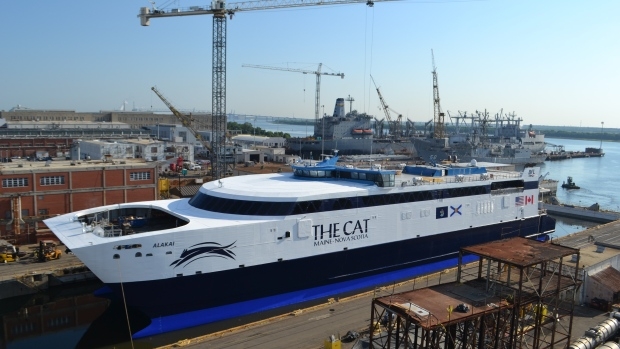You would think — given the circumstances and the season of the sun — that government officials would do almost anything to avoid ending up naked, deer-in-the-headlights, in front of microphones where they might be asked impertinent questions about ferries that don’t ferry and related matters. You would be mistaken.

No! Really? Couldn’t be. But there it was. In virtual black and white. “If Yarmouth ferry sailed even once this year, it would be productive: official,” read the headline over CBC reporter Jean Laroche’s piece last week about the latest twisty turn in the long since careened-off-the-rails story of the Yarmouth ferry.
You would think — given the circumstances and the season of the sun — that government officials would do almost anything to avoid ending up naked, deer-in-the-headlights, in front of microphones where they might be asked impertinent questions about ferries that don’t ferry and related matters.
Circumstances? Related matters? Season of the sun?
- The heavily subsidized Yarmouth-Bar Harbor (né Yarmouth-Portland) tourist ferry hasn’t carried a single tourist all season.
- The ferry service has been a one-thing-after-another disaster since it began its — did I mention heavily subsidized; can you say $15-million a year? — service back in 2016.
- In 2018, the province paid $1.5 million to upgrade a Portland, ME, ferry terminal the Yarmouth ferry no longer uses. In 2019, the province is shelling out $8.5-million to upgrade a Bar Harbor ferry terminal it still can’t use.
- Bay Ferries, the operator, is keeping a crew in Yarmouth so it can be there and ready if the ferry ever gets the OK to sail. Taxpayers are apparently footing the bill for that as part of the secret management contract between company and government. Not to forget all the other “our” costs: crew accommodation and meal costs, docking fees, pilot authority fees, charter fees, and more fees.
- The government continues to fight in the courts to keep its secret (mis)management contract with the non-operators of the ferry secret to protect… well, its apparent incompetence at contract-making.
- Lloyd Hines, Nova Scotia’s minister of maladroitness keeps finding new ways to stick his foot in his mouth.
- “We are very confident this [ferry] operation is going to continue this year. Yeah, there is an element of uncertainty around what would happen if whatever kind of Scud missile came that took the operation out but, at this point in time, we are confident this is a prudent expenditure of taxpayer money.” February 2019.
- “In five years this [controversy over spending taxpayers’ money [to upgrade the ferry terminal in Bar Harbor] will be a vague memory because this service going to be proven very successful.” March 2019.
- “We didn’t nail down a definitive time [to start the 2019 ferry season after three days of meetings in Washington] but we are certainly optimistic that we will have a partial season this year.” July 2019.
And so it continues deep into the summer news-free season when prudent governments usually do their best to avoid reminding voters of messes of their own making.

And yet there was our sometimes combative but usually strategically smart deputy minister of transportation, Paul LaFleche, sticking his foot where no one — save the ever-sticking Lloyd Hines — has trod.
LaFleche told reporters the province had no deadline for canceling whatever remains of this year’s ferry season. The “drop-dead date,” he told reporters, is “the last day of sailing.”
To be fair — and we always like to be fair — LaFleche’s rationale does make some sense. “We would like to try and sail this year, if at all possible, because if we can get the full compliance stamp [for the terminal], then we have nothing blocking us from sailing early next year,” he explained.
But the optics are cross-eyed.
And worse — and much more serious — LaFleche’s other comments to reporters that day highlighted what appears to be a disconnect among provincial officials, Bay Ferries and US Customs and Border Services, which must sign of off on the terminal upgrades before the ferry is allowed to sail.
LaFleche claims that, based on past experience — and also in the view of the engineer the province hired to oversee the work — the approval process should have taken a few months. “We filed [our regulatory paperwork] in March,” LaFleche said, adding “it would have been reasonable for us to be sailing in July until something changed in the world. They [US authorities] changed the way they did things and that now applies to everybody and we may be caught up in that.”
But that flies in the face — smacks the face even — of what US Customs and Border Services spokesperson Michael McCarthy told Canadian Press on June 25.
“Generally, these types of projects take 12 to 18 months,” McCarthy told CP. “That time frame was shared with the ferry operator going back to at least 2017.”
Which raises yet more — and ever more significant — questions for the province and Bay Ferries, the ferry operator.
- Did US officials actually tell Bay Ferries that the process would take 12-18 months?
- Did Bay Ferries convey that information to the Nova Scotia government, which not only subsidizes the ferry itself, but was also being required to pony up $8.5-million to self-fund a ferry terminal renovation in another country?
- If the province knew about this, why didn’t government officials nix the idea of moving to Bar Harbor until the proper approvals could be in place?
- If the province did know and failed to act, shouldn’t the minister responsible resign?
- If the province didn’t know about it, why not?
- Will Bay Ferries pay a financial or other price if it failed to notify the province of such a significant issue?
There are more than enough questions there to take us through the rest of the summer news doldrums.
Thanks, Paul LaFleche.
This column first appeared in the Halifax Examiner July 15, 2019.




 STEPHEN KIMBER, a Professor of Journalism at the University of King's College in Halifax and co-founder of its MFA in Creative Nonfiction Program, is an award-winning writer, editor and broadcaster. He is the author of two novels and eight non-fiction books. Buy his books
STEPHEN KIMBER, a Professor of Journalism at the University of King's College in Halifax and co-founder of its MFA in Creative Nonfiction Program, is an award-winning writer, editor and broadcaster. He is the author of two novels and eight non-fiction books. Buy his books